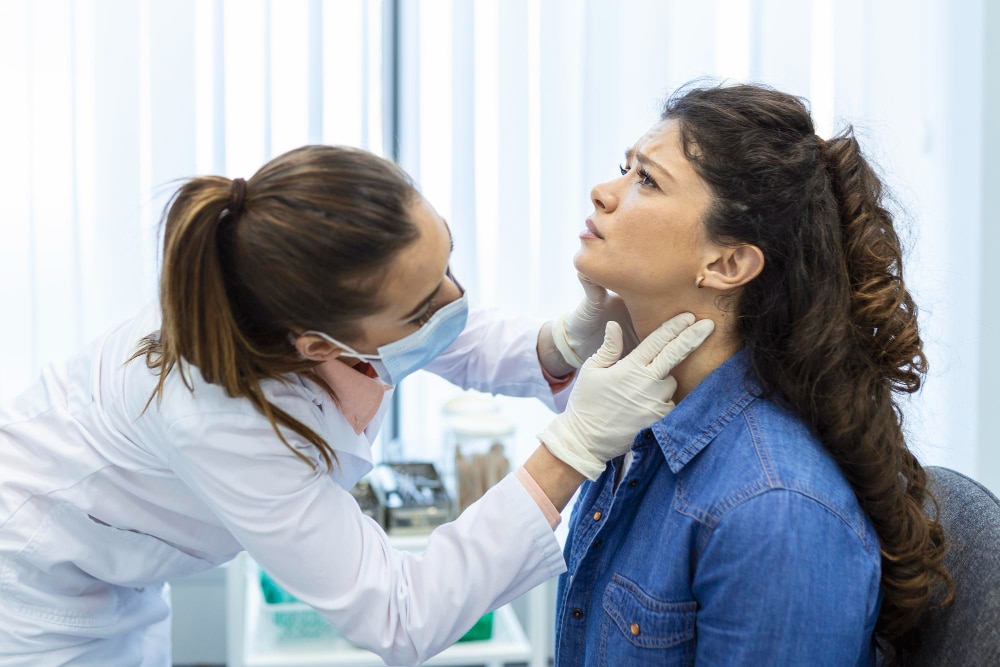A variety of health conditions affecting the thyroid, a vital butterfly-shaped gland in the neck, are collectively known as thyroid disorders. This gland plays a crucial role in our body’s metabolic regulation, producing hormones that significantly influence different physiological activities. In this article, we will delve into the origins, symptoms, risk factors, diagnostic methods, and practices for treating thyroid disorders.
What is the Thyroid Gland?
Perched at the base of our neck, the thyroid may be small in size, but it’s mighty in function. It’s tasked with the crucial role of generating and releasing hormones, especially T4 (thyroxine) and T3 (triiodothyronine), which are integral to regulating our body’s metabolism. Online GP registration on Consultdoc makes it easier for patients to access information and guidance about thyroid health from the comfort of their homes.
Causes
There are numerous causes behind thyroid disorders. They include:
Autoimmune Diseases:
Conditions like Graves’ disease (an overactive gland condition) and Hashimoto’s disease (an underactive gland condition) are triggered when the immune system mistakenly attacks the gland.
Iodine Imbalance:
Iodine is crucial for hormone production. An imbalance can lead to problems. Excessive iodine can trigger an overactive gland, while a deficiency might lead to an underactive one.
Nodules:
Lumps or nodules on the gland can lead to overproduction of hormones. Online GP services on Consultdoc can be particularly helpful for patients in providing access to specialists and expert advice promptly.
Thyroiditis:
Inflammation of the gland, often post-viral infection, can temporarily cause symptoms of an overactive gland followed by an underactive phase.
Risk Factors
Thyroid disorders can be influenced by various risk factors. A significant one is family history; individuals with relatives who have experienced similar conditions are more prone to encounter them as well. Gender also plays a crucial role, with women being more susceptible than men. Age is another vital factor, as susceptibility increases with advancing years. Exposure to radiation, especially in the neck or head regions, can heighten the risk. Lastly, there is a close link between autoimmune diseases and the occurrence of these disorders, particularly when the immune system mistakenly targets this gland.
Symptoms
As previously mentioned, there are two primary categories of thyroid disorders: hyperthyroidism (overactive) and hypothyroidism (underactive). Each present with distinct symptoms:
Hyperthyroidism:
An overactive condition leads to symptoms like anxiety, restlessness, sleep disturbances, unintentional weight loss, and increased sensitivity to heat. Engaging with an online endocrinologist on Consultdoc can be crucial here, as this condition can sometimes lead to respiratory issues. People with hyperthyroidism may notice:
- A noticeable increase in metabolic rate leads to higher energy usage.
- Enhanced heart rate or palpitations.
- Weight loss that occurs unexpectedly, despite normal or increased food intake.
- Increased feelings of anxiety, nervousness, and agitation.
Hypothyroidism
In contrast, hypothyroidism arises from reduced activity of the thyroid gland, presenting symptoms such as:
- Ongoing tiredness and weakness, which persists even after resting.
- Unexplained weight gain, occasionally coupled with fluid retention.
- A heightened sensitivity to cold temperatures, finding even mild cold challenging.
Diagnosis Journey
The journey toward diagnosing thyroid disorders typically begins with a clinical evaluation of symptoms. This is usually followed by a series of blood tests to measure hormone levels, with doctors often conducting a TSH (Thyroid Stimulating Hormone) test as an initial step. Depending on these results, further tests like Free T4, Free T3, and thyroid antibody tests may be necessary. To manage symptoms effectively and determine the precise nature of the condition, patients can consider GP near me service on Consultdoc to connect with healthcare providers for initial assessments determining the precise nature of the condition and guiding the subsequent treatment approach.
Treatment Options
Treatment typically depends on the specific disorder and its severity:
Medication
Medications play a crucial role in treating both overactive and underactive gland conditions, aiming to restore hormone balance. Anti-thyroid drugs like Methimazole are often prescribed, while levothyroxine is a standard treatment for hypothyroidism.
Radioactive Iodine
Radioactive iodine therapy is particularly effective for shrinking an overactive gland and decreasing excessive hormone production. This therapy targets only the thyroid cells, minimizing exposure to the rest of the body. It’s important for patients to maintain regular follow-ups, which can be facilitated through online doctor consultation on Consultdoc platform.
Surgery
Surgery is a critical option for treating thyroid issues such as goiter, nodules, or cancer. The extent of thyroid removal required depends on the complexity and nature of the issue at hand. Following the procedure, some patients may require hormone replacement therapy to maintain optimal bodily functions.
Therapy
Managing an underactive thyroid, or hypothyroidism, necessitates the implementation of hormonal therapy, predominantly utilizing synthetic variants of thyroid hormones, such as levothyroxine. The primary objective of this treatment is to replicate the natural operations of the thyroid gland, ensuring a consistent balance in hormone levels.
Lifestyle Adjustments
Lifestyle adjustments, including dietary changes, stress management, regular exercise, and ensuring sufficient sleep, play a supportive role in treatment. For thyroid health, a balanced diet rich in iodine, selenium, and zinc is beneficial.
Preventive Measures
Embracing a healthy lifestyle significantly aids in averting disorders related to the gland. It’s important to monitor the intake of dietary iodine, a key element in hormone synthesis. Consistent health evaluations are crucial for the timely recognition of hormonal imbalances. Reducing unnecessary radiation exposure and understanding the impact of certain medications on gland functionality are vital steps.
Conclusion
Thyroid disorders, while common, but effectively manageable with prompt diagnosis and the right medical approach. Staying educated about one’s health, undergoing regular medical examinations, and keeping transparent communication with healthcare providers are indispensable actions. These steps not only aid in early detection and effective treatment of thyroid disorders but also contribute significantly to sustaining overall health, enabling individuals to live healthier, more balanced lives. Additionally, adopting a proactive approach towards lifestyle choices, such as maintaining a balanced diet, regular exercise, and stress management, plays a vital role in treating thyroid disorders.
